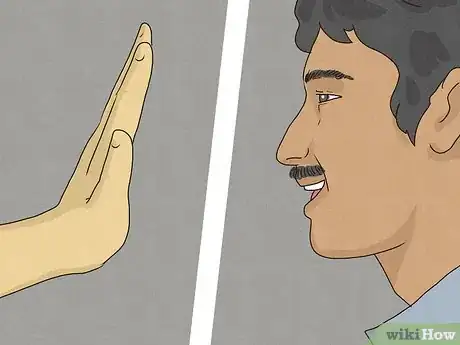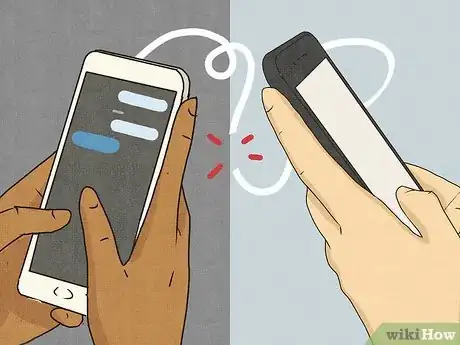This article was co-authored by Jay Reid, LPCC and by wikiHow staff writer, Madeleine Flamiano. Jay Reid is a Licensed Professional Clinical Counselor (LPCC) in private practice in San Francisco, CA. He specializes in helping clients who have survived a narcissistic parent or partner. Treatment focuses upon helping clients identify and challenge self-diminishing beliefs as a result of narcissistic abuse. Jay holds a BA in Psychology from the University of Pennsylvania and an MS in Clinical Psychology from Penn State University.
There are 12 references cited in this article, which can be found at the bottom of the page.
This article has been viewed 11,461 times.
Is there anyone in your life who keeps comparing you to someone else? This is a really common experience when you encounter “triangulation,” a form of bullying that occurs when a narcissist brings up another person to make you feel badly about yourself. It can happen in families, relationships, friendships, and even the workplace. This article will cover how to respond to a narcissist’s triangulation and provide tips so you can protect yourself. Here, you’ll learn to stand up for yourself and stay strong.
Steps
Expert Q&A
-
QuestionWhat is the behavior pattern of a narcissist?
 Jay Reid, LPCCJay Reid is a Licensed Professional Clinical Counselor (LPCC) in private practice in San Francisco, CA. He specializes in helping clients who have survived a narcissistic parent or partner. Treatment focuses upon helping clients identify and challenge self-diminishing beliefs as a result of narcissistic abuse. Jay holds a BA in Psychology from the University of Pennsylvania and an MS in Clinical Psychology from Penn State University.
Jay Reid, LPCCJay Reid is a Licensed Professional Clinical Counselor (LPCC) in private practice in San Francisco, CA. He specializes in helping clients who have survived a narcissistic parent or partner. Treatment focuses upon helping clients identify and challenge self-diminishing beliefs as a result of narcissistic abuse. Jay holds a BA in Psychology from the University of Pennsylvania and an MS in Clinical Psychology from Penn State University.
Licensed Professional Clinical Counselor First, there is a phase of idealization where the narcissist may make their partner feel adulated. After some time, the narcissist starts a subtle campaign of criticism. Gradually, the situation deteriorates, and the narcissist begins to disrespect their partner and even humiliates them in the presence of others.
First, there is a phase of idealization where the narcissist may make their partner feel adulated. After some time, the narcissist starts a subtle campaign of criticism. Gradually, the situation deteriorates, and the narcissist begins to disrespect their partner and even humiliates them in the presence of others. -
QuestionWhat can motivate a narcissist to change?
 Jay Reid, LPCCJay Reid is a Licensed Professional Clinical Counselor (LPCC) in private practice in San Francisco, CA. He specializes in helping clients who have survived a narcissistic parent or partner. Treatment focuses upon helping clients identify and challenge self-diminishing beliefs as a result of narcissistic abuse. Jay holds a BA in Psychology from the University of Pennsylvania and an MS in Clinical Psychology from Penn State University.
Jay Reid, LPCCJay Reid is a Licensed Professional Clinical Counselor (LPCC) in private practice in San Francisco, CA. He specializes in helping clients who have survived a narcissistic parent or partner. Treatment focuses upon helping clients identify and challenge self-diminishing beliefs as a result of narcissistic abuse. Jay holds a BA in Psychology from the University of Pennsylvania and an MS in Clinical Psychology from Penn State University.
Licensed Professional Clinical Counselor If a narcissist realizes that their behavior is harmful to their relationships and professional life, it may motivate them to change.
If a narcissist realizes that their behavior is harmful to their relationships and professional life, it may motivate them to change.
References
- ↑ Jay Reid, LPCC. Licensed Professional Clinical Counselor. Expert Interview. 7 August 2020.
- ↑ https://psychcentral.com/blog/psychology-self/2019/10/triangulation-and-narcissism
- ↑ https://www.psychologytoday.com/us/blog/fulfillment-any-age/201408/8-ways-handle-narcissist
- ↑ Jay Reid, LPCC. Licensed Professional Clinical Counselor. Expert Interview. 7 August 2020.
- ↑ https://psychcentral.com/blog/recovering-narcissist/2017/07/3-sneaky-techniques-covert-narcissists-use-to-disarm-and-demean-you#4
- ↑ https://psychcentral.com/blog/narcissism-decoded/2017/06/11-ways-to-set-boundaries-with-narcissists#7
- ↑ https://psychcentral.com/pro/exhausted-woman/2016/01/how-to-handle-controlling-people#1
- ↑ https://www.psychologytoday.com/us/blog/narcissism-demystified/202006/7-ways-set-boundaries-narcissists
- ↑ Jay Reid, LPCC. Licensed Professional Clinical Counselor. Expert Interview. 7 August 2020.
- ↑ https://www.crisistextline.org/topics/emotional-abuse/#how-to-cope-with-emotional-abuse-5
- ↑ https://www.thehotline.org/resources/5-powerful-self-care-tips-for-abuse-and-trauma-survivors/
- ↑ https://health.clevelandclinic.org/how-to-heal-from-emotional-abuse/
- ↑ https://www.psychologytoday.com/us/blog/here-there-and-everywhere/201606/how-leave-narcissist-good
- ↑ https://www.choosingtherapy.com/recovering-from-narcissistic-abuse/






































































